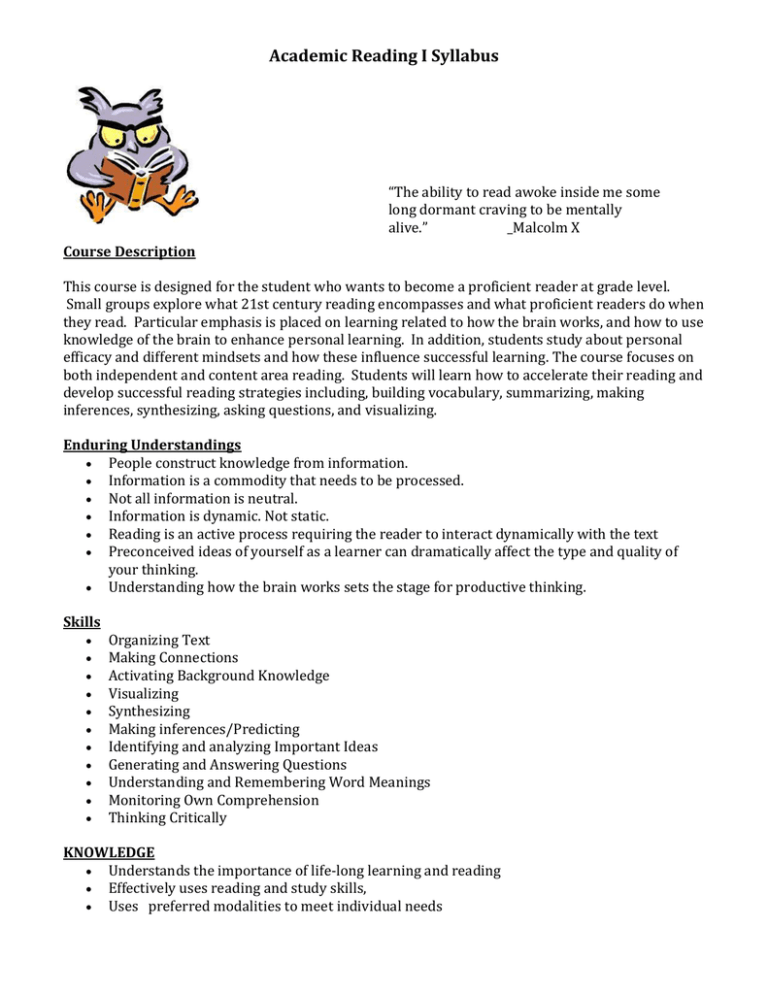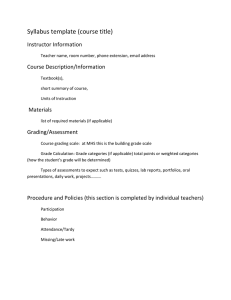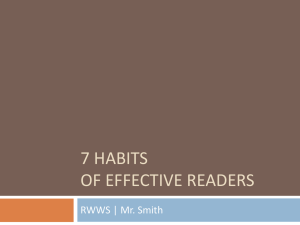Academic Reading I Syllabus
advertisement

Academic Reading I Syllabus “The ability to read awoke inside me some long dormant craving to be mentally alive.” _Malcolm X Course Description This course is designed for the student who wants to become a proficient reader at grade level. Small groups explore what 21st century reading encompasses and what proficient readers do when they read. Particular emphasis is placed on learning related to how the brain works, and how to use knowledge of the brain to enhance personal learning. In addition, students study about personal efficacy and different mindsets and how these influence successful learning. The course focuses on both independent and content area reading. Students will learn how to accelerate their reading and develop successful reading strategies including, building vocabulary, summarizing, making inferences, synthesizing, asking questions, and visualizing. Enduring Understandings People construct knowledge from information. Information is a commodity that needs to be processed. Not all information is neutral. Information is dynamic. Not static. Reading is an active process requiring the reader to interact dynamically with the text Preconceived ideas of yourself as a learner can dramatically affect the type and quality of your thinking. Understanding how the brain works sets the stage for productive thinking. Skills Organizing Text Making Connections Activating Background Knowledge Visualizing Synthesizing Making inferences/Predicting Identifying and analyzing Important Ideas Generating and Answering Questions Understanding and Remembering Word Meanings Monitoring Own Comprehension Thinking Critically KNOWLEDGE Understands the importance of life-long learning and reading Effectively uses reading and study skills, Uses preferred modalities to meet individual needs Reads at grade level or above Knows how to think about their thinking to construct knowledge (Metacognition) Increases working vocabulary Uses communication and listening skills effectively Expectations General classroom expectations o Attendance Attend class daily. Unexcused absences result in no credit for the missed day’s work. o Tardiness Report on time. The third tardy and every subsequent tardy is a detention. If you are late for class and are excused, silently hand me your pass and take a seat. o Materials Have materials/homework ready daily Supply list Composition Notebook Folder Pen AND pencil Technology Please use your cell phone outside of class. Don’t miss a chance to be learning because you are busy on your phone. Using class time to text, check messages, etc. is not a good use of your time and puts you in the inconvenient position of having to give up your cell phone for the rest of the day. Food and drink Feel free to bring water to class to drink. Other food or drink should be consumed during lunch or free periods. Class participation Participation in this class is important. Research supports the efficacy of collaborative learning. Generously sharing your thinking and learning makes us all smarter. Grading: Grades are based on class participation, independent reading, class assignments, weekly work, and projects. Grading Scale: A B C D Contact Information Nancy Saguto Email: nancysaguto@claytonschools.net 100-90% 89-80% 79-70% 69-60% Phone: 314-854-6052 (work voicemail)

